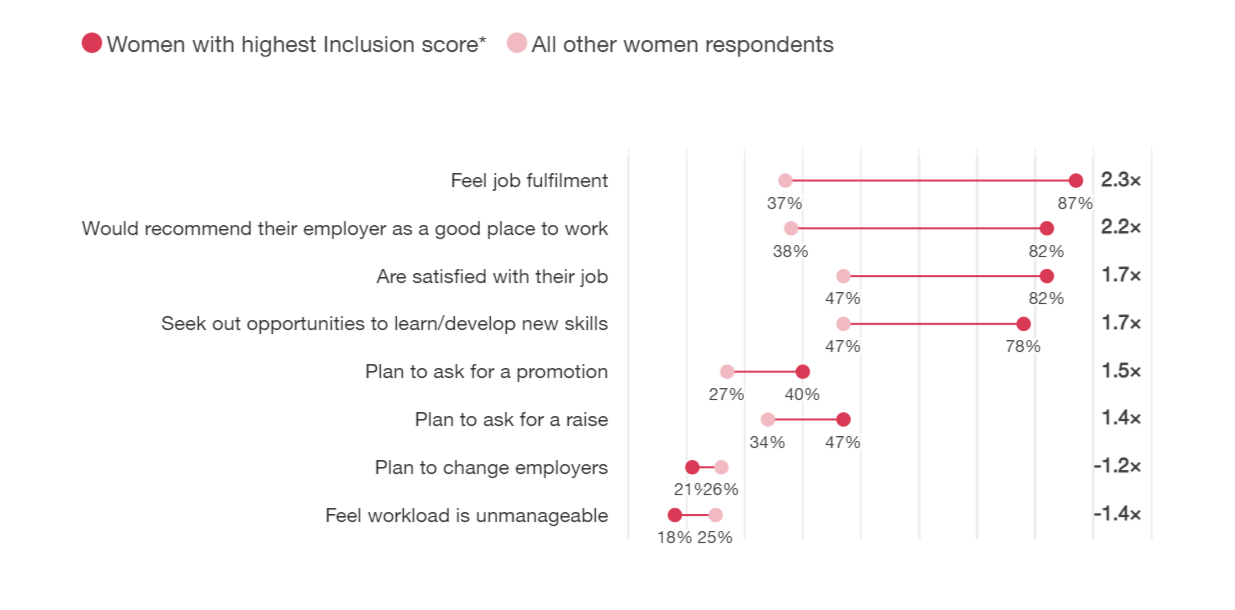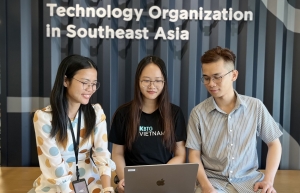PwC study shows progress towards gender parity is still slow
PwC drew insights from its Global Hopes and Fears Survey 2023, to compile the Inclusion Matters research, sharing fresh gender-focused perspectives from close to 54,000 workers globally, almost 23,000 of whom are women. The research includes a Workplace Inclusion Indicator Index that measures three key dimensions of inclusion: belonging, fairness, and inclusive decision-making - and finds a statistically significant gender gap in favour of men.
Inclusion is key to achieving gender parity in the workplace
PwC’s Inclusion Matters research confirms that disparity in pay is a pain point for women in the workplace: only 39 per cent of women feel they are being fairly rewarded financially for their work.
The research finds that there is a significant gap between the inclination of men and women to ask for promotions (-9 points) and pay raises (-8 points). However, women with Inclusion Index scores in the top quartile are 1.4 times more likely to ask for a raise, and 1.5 times more likely to ask for a promotion.
They are also 2.2 times more likely to recommend their employer as a place to work. Women’s turnover intentions increased (+8 points) this year, with one in four women planning to change employers in the next 12 months, just slightly below the turnover intention rate for men (at 27 per cent). This highlights a further reason why inclusion matters: women with higher inclusion scores are 1.2 times less likely to change employers.
The report also finds that inclusion is positively correlated with self-driven development: women feeling higher levels of inclusion are 1.7 times more likely to be actively seeking out opportunities to learn and develop new skills.
 |
| The women who feel the greatest impacts of workplace inclusion are significantly more likely to actively seek progression and development opportunities (Source: PwC’s Global Workforce Hopes and Fears Survey 2023) |
Inclusion supports greater readiness from women to future-proof their careers, which will be critical in driving gender equity gains at work. Women with high inclusion scores foresee greater benefits to their jobs from AI (+6 points), have a clear sense of how the skills their jobs require will change in the next five years (+14 points), and are more confident their employers will support with upskilling on key development skills (+21 points).
Both women and men who have hybrid work patterns – defined as a mix of in-person and remote working – have the highest inclusion scores when it comes to work patterns. Women with higher inclusion scores are also less likely to be feeling the impact of overwork, and 1.4 times less likely to say that their workloads are frequently unmanageable.
In term of job level, women in senior executive and management positions are feeling significantly higher levels of workplace inclusion than women in non-management positions (+9 points).
Millennial women feel the highest level of inclusion in the workplace, followed by Gen Z. However, Gen Z is the only generation where women feel similarly included to men.
Women working in the technology industry had the highest Inclusion Index score across all 26 industries included in the research; the technology industry was one of only four industries in which women had slightly higher inclusion scores than men.
What can employers do?
Inclusion at work is a catalyst for women’s development and advancement, and positions them more strongly to respond to key workforce developments, such as skills and AI reinvention. Employers can accelerate their progress on inclusion by focusing on what women say as important, and combining this with a strategic approach to Inclusion and Diversity. To help achieve this, here are four ways in which companies can create greater gender equity:
Listen, measure and establish accountability
To enhance women's representation and advancement, employers should adopt a data-driven approach by measuring gender proportionality in various aspects like hires, performance ratings, promotions, and departures. Predictive analytics can then identify the most impactful measures to address potential gaps.
Employers can further gather insights through surveys and listening tools, segmenting data by location, business unit, or identity factors such as ethnicity or disability (where legally possible). Regular assessments can establish a baseline, track progress, define Key Performance Indicators (KPIs), and develop an accountability infrastructure.
Build inclusive leadership skills
The right training can help leaders to learn and understand the ways in which unconscious biases can distort their decision-making about people and business issues, particularly those biases stemming from gender stereotypes and entrenched perceptions that often hold women back.
Inclusive leadership also requires the capacity to show empathy, appreciation, and respect for every individual’s unique lived experience, while fostering an environment of psychological safety in which everyone feels empowered to speak up.
A focus on inclusion from day one, and for everyone
This research highlights that women are experiencing significantly lower levels of workplace inclusion than men, and that women in non-management positions have the lowest Inclusion Index scores. Broad and sustainable progress across organisations will only be achieved by combining a laser focus on leadership diversity, with substantive action that drives an inclusive talent culture and talent systems from day one and from the ground up.
This means establishing critical Inclusion and Diversity interventions that work throughout the whole talent lifecycle. Without tackling the systemic challenges that arise earlier in the talent process, organisations will continue to face the same diversity gaps in the succession pipeline at the top.
 |
Make pay schemes fair
This Inclusion Matters research confirms that pay is a pain point for women in the workplace. Tellingly, only 39% of women feel they are being fairly rewarded financially for their work. In any discussion of financial compensation, the key words are ‘objective’ and ‘fair’. It follows that creating reward and pay schemes that are fair and based on merit, and preventing the potential impacts of unconscious bias will be critical in achieving stronger gender equality in the workplace.
So, alongside the gender proportionality of things like hires and promotions, reward is a further table-stakes data point on diversity that should be measured rigorously and consistently. And monitoring reward is not a one-off exercise: there’s a need for ongoing measurement and correction, paying particular attention at events and inflection points that might influence pay fairness across the workforce – including major initiatives such as acquisitions, headcount reductions, or efforts to attract talent with in-demand skills.
Angela Yang, inclusion and diversity Leader of PwC Vietnam, said, “At PwC, we truly believe that inclusion matters in driving progress towards gender parity. Our research shows that workplace inclusion is an important lever in propelling women’s development and advancement, and that a workplace where women feel that they belong, are included in decision-making, and are treated fairly and equitably, is a workplace where women can thrive.”
 | Nestlé Vietnam contributes to elevating the role of women across the supply chain With a strong commitment to empowering women, especially those in rural areas, Nestlé Vietnam is implementing many initiatives across its supply chain, such as the NESCAFÉ Plan and the Nestlé Accompanies Women programme. |
 | KBTG Vietnam spearheads gender inclusivity in technology In the rapidly evolving, male-dominated technology industry, KBTG Vietnam – the local technology arm of KASIKORNBANK (KBank), one of Thailand's leading commercial banks – stands out not just for its technological innovations but also for fostering a culture of female empowerment and leadership. |
 | Grab introduces Women Programme for driver-partners On March 6, Grab announced the launch of its Women Programme for driver-partners, an initiative that aims to support women in Vietnam to become drivers on its platform. |
What the stars mean:
★ Poor ★ ★ Promising ★★★ Good ★★★★ Very good ★★★★★ Exceptional
 Tag:
Tag:
Related Contents
Latest News
More News
- Vietnamese consumers express concern about climate change (October 11, 2025 | 14:06)
- ESG seen as key to Vietnam’s business credibility and capital attraction (September 29, 2025 | 18:38)
- From compliance to strategy: ESG criteria gaining ground (September 29, 2025 | 15:47)
- Vietnamese firms step up ESG game (September 23, 2025 | 15:26)
- Vietnam tax and legal changes set to shape foreign investment landscape (September 16, 2025 | 13:46)
- Vietnamese businesses navigate US tariffs (June 25, 2025 | 12:14)
- The impact of cloud, AI, and data on financial services (April 14, 2025 | 11:20)
- Vietnam 2025 M&A outlook: trends, deals, and opportunities (March 21, 2025 | 08:54)
- Vietnam's M&A landscape mirrors global trends (February 18, 2025 | 17:13)
- Asia-Pacific CEOs enter 2025 with optimism and caution (February 06, 2025 | 17:16)





















 Mobile Version
Mobile Version